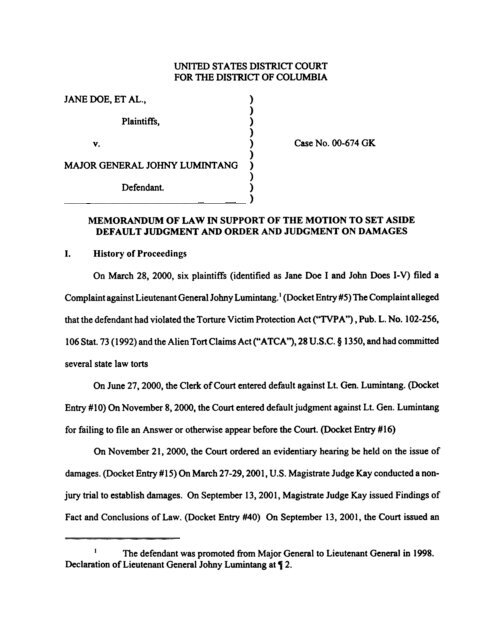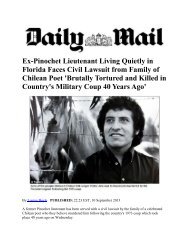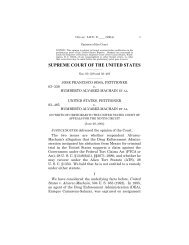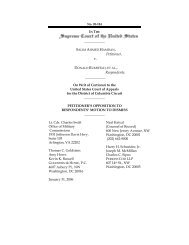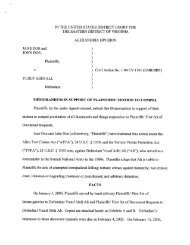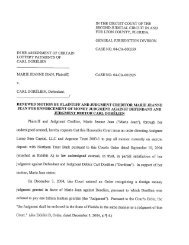Defendant's Motion to Set Aside Default Judgment - Center for ...
Defendant's Motion to Set Aside Default Judgment - Center for ...
Defendant's Motion to Set Aside Default Judgment - Center for ...
Create successful ePaper yourself
Turn your PDF publications into a flip-book with our unique Google optimized e-Paper software.
as training and education, payment and housing of personnel, procurement in general and provisionof equipment, <strong>for</strong> the command and its elements. Lumintang Dec. at' 3; Declaration of LieutenantColonel Natsri Anshari ("Anshari Dec.") at 1 143; Declaration of Brigadier General Sihombing("Sihombing Dec.") at 1 7 and Exhibit E attached there<strong>to</strong>.4 He did not have any command or controlover troops and personnel engaged in operational matters or authority <strong>for</strong> planning, commanding,High Command. LumintangDec. at' 3; Sihombing Dec. at W 3-10 and Exhibits A-E attachedthere<strong>to</strong>. Lt. Gen. Lumintang has never been a member of the Armed Forces!I'NI High Command.14.On March 6, 2000, Lt. Gen. Lumintang received an invitation dated March 3, 2000 fromAmbassador Edward Masters, the President of Us indo (United StatesIndonesian Society), 1625Massachusetts Ave., N.W., Washing<strong>to</strong>n, DC 20036-2245, <strong>to</strong> participate in a panel discussion inWashing<strong>to</strong>n DC on March 28, 2000. 1.4. at 1 4. At the time Lt Gen. Lumintang received theinvitation, he was the Governor of the National Defense Institute in Indonesia. IQ.Lt. Gen,Lumintang accepted the invitation. Lumintang Dec. at 1 4.He received no payment orcompensation <strong>to</strong> participate in the panel discussion. 14. His transportation and hotel costs and allother expenses related <strong>to</strong> the trip were paid by the Government of Indonesia. 1.4.On March 26, 2000, Lt. Gen. Lumintang traveled from Jakarta, Indonesia <strong>to</strong> DullesInternational Airport ("Dulles") in Virginia. M. at' 5. On March 28,2000, he attended the panelExhibit 2.4The Declaration of Lieutenant Colonel Natsri Anshari is attached here<strong>to</strong> asThe Declaration of Brigadier General Sihombing is attached here<strong>to</strong> as Exhibit 35
discussion of the U.S. Indonesian Society which <strong>to</strong>ok place at The Cosmos Club at 2121Massachusetts Ave., N.W., Washing<strong>to</strong>n, D.C. 14. at 1 5While in the Washing<strong>to</strong>n, D.C.,metropolitan area, Lt. Gen. Lumintang stayed at the Park Hyatt Hotel in Washing<strong>to</strong>n, D.C. M. at ~6. He visited the Indonesian Embassy at 2020 Massachusetts Ave., N. W. <strong>to</strong> meet with colleagueson non-business matters. IQ. at 1 6. He also paid a social call on Mr. Paul Wolfowitzt <strong>for</strong>mer U.S.Ambassador <strong>to</strong> Indonesia and Ms. Karen Brookes and did some sightseeing.l4. He made no otherspeeches, presentations or appearances of any kind and did not engage in any fund raising on be~alfof the Government of Indonesia or any of its agencies. IQ. Lt. Gen. Lumintang received no paymen<strong>to</strong>r compensation <strong>for</strong> any of his appearances, visits or activities while in the United States and neverconducted any business while he was in the United States.14. at' 6, 8.On March 30, 2000, Lt. Gen. Lumintang left the United States <strong>for</strong> Frankfurt, Germany onan Air France flight from Dunes. 1.4. at 15. Other than his visit from March 26 through March 30,2000, Lt. Gen. Lumintang has only been in the United States five times: once <strong>to</strong> attend the InfantryOfficer Advanced Course in Ft. Benning, Georgia in 1978; once <strong>to</strong> attend the illMC at the NPC inMonterey, Cali<strong>for</strong>nia in 1989; once <strong>to</strong> attend the Special Forces Seminar in Honolulu, Hawaii; once<strong>to</strong> participate in a study <strong>to</strong>ur of students of the National Defense Institute in 1995; and once <strong>to</strong> attendthe Roundtable Dialogue on Justice and Reconciliation at the Madison Hotel in Washing<strong>to</strong>n, D.C.on January 24, 2000. IQ. at ~ 7.Lt. Gen. Lumintang has never transacted or conducted any business, contracted <strong>to</strong> supply anyservices or had an interest in or use of or possessed any real property in the District of Columbia oranywhere else in the United States or done so with any individual resident in the District ofColumbia or the United States. M. at , 8,He has no relatives in the District of Columbia or6
or anywhere else in the United States. M. He has never contracted <strong>to</strong> insure or act as surety <strong>for</strong> or.on any person, property, or risk, contract, obligation, or agreement located, executed, or <strong>to</strong> beperfonned within the District of Columbia or anywhere else in the United States. 14. He has neverengaged in a persistent course of conduct, or any course of conduct <strong>for</strong> that matter, in the Distric<strong>to</strong>f Columbia or anywhere else in the United States or derived revenue from goods or services used,consumed or rendered in the District of Columbia or anywhere else in the United States. M.On March 30, 2000, around 5:00 P.M., on the way <strong>to</strong> leaving <strong>for</strong> Jakarta, Lt. Gen. Lumintangarrived at Dulles in the company of Brigadier General Dadi Susan<strong>to</strong>. M. at , 9; Declaration ofBrigadier General Dadi Susan<strong>to</strong> ("Susan<strong>to</strong> Dec.") at 1 4.S L'Gen. Lumintang and Brig. Gen.Susan<strong>to</strong> were in the concourse outside of the boarding area <strong>for</strong> Lt. Gen. Lumintang's Air Franceflight, when they were approached by a Caucasian man who was a stranger <strong>to</strong> them.}g. The mansought <strong>to</strong> identify General Lumintang. 14.The man never identified himself or his purpose.LumintangDec. at' 9. After Lt. Gen. Lumintang identified himselft the man attempted <strong>to</strong> hand hima thick sheaf of papers. Lumintang Dec. at ~ 9.; Susan<strong>to</strong> Dec. at ~ 4. Lt. Gen. Lumintang had no ideathat this man was trying <strong>to</strong> serve him with legal papers. Lumintang Dec. at 1 9. Fearing that theLumintang not <strong>to</strong> take the papers and knocked the papers out of the man's hand <strong>to</strong> the ground.Lumintang Dec. at 19.; Susan<strong>to</strong> Dec. at 4j! 4. Lt. Gen. Lurnintang never <strong>to</strong>uched or read the papersfrom the man.!4. The man left without saying anything else or picking up the papers.!4. Lt. Gen.4,The Declaration of Brigadier General Dadi Susan<strong>to</strong> is attached here<strong>to</strong> as Exhibit7
Lumintang then went <strong>to</strong> the boarding area with Brig. Gen. Susan<strong>to</strong> and boarded his plane withoutever <strong>to</strong>uching or receiving the papers from the man.l4. Brig. Gen. Susan<strong>to</strong> instructed his driver <strong>to</strong>pick up the papers and take them <strong>to</strong> his car. Susan<strong>to</strong> Dec. at 1 5By law enacted in 2000, the Indonesian Government established a Human Rights Court andauthorized the At<strong>to</strong>rney General <strong>to</strong> investigate alleged gross violations of human rights in Indonesia,including East Timor. Lumintang Dec. at 1 11; Anshari Dec. at" 3-4 and Exhibits A and B attachedthere<strong>to</strong>. On May 4,2000, Lt. Gen. Lumintang was called be<strong>for</strong>e the Office of the At<strong>to</strong>rney Generalof Indonesia and interrogated concerning gross violations of human rights by members of themilitary and others in East Timor. Lurnintang Dec. at 11; Anshari Dec. at , 5. On January 30,2002, a list was published of the names of officers in the military and police who were suspected bythe At<strong>to</strong>rney's General's Office of having committed human rights violations in East Timor.Lumintang Dec. at 1 11 and Exhibit A attached there<strong>to</strong>; Anshari Dec. at 1 10. Lt. Gen. Lurnintangwas not listed as a suspect. 14. On January 31, 2002, Lt. Gen. Lurnintang received a letter signedby the At<strong>to</strong>rney General of the Republic ofIndonesi~ Mr. H.M.A. Rachman, certifying that Lt. Gen.Lumintang was not a suspect in the case of gross violations of human rights in East Timor. M. at 112 and Exhibit B attached there<strong>to</strong> The letter statesThe At<strong>to</strong>rney General of The Republic of Indonesia hereby certifies that theTeam of Investigation on Gross Violation of Human Rights in East Timor hasinterrogated Army Lieutenant General Johny J Lumintan~Based on the result of the interrogation Army Lieutenant General JohnyJ Lumintang is stated not as a suspect in the case of gross violations of human rightsin East Timor. (Emphasis in original.1.4.8
IV.ArgumentA Rule~) of the Federal Rules of Civil Procedure1. The PuInQse of a Rule 60(12) <strong>Motion</strong>Rule 6O(b), F.R.C.P., allows a district court <strong>to</strong> grant a motion <strong>for</strong> relief from a finaljudgmen4 order or proceeding, including default judgments or judgments <strong>for</strong> damages, <strong>for</strong> certainreasons enumerated in the Rule.6 Properly applied, Rule 6O(b) strikes a balance between serving theends of justice and preserving the finality of judgments. House v. Secrema of Health and HumanServices, 668 F.2d 7. 9 (2d Cir. 1982); Seven Elves. Inc. v. Eskenazi. 635 F.2d 396, 401 (5th Cir.1981) Although final judgments should not be lightly reopened, Rule 60(b) should be broadlyconstrued <strong>to</strong> do "substantial justice." Seven Elves. 635 F .2d at 401. "Given the longstanding goalof allowing parties <strong>to</strong> prosecute the merits of contested lawsuits, courts grant relief from defaultjudgments liberally." MCI Telecommunications Com. v. The Travel S~cialist, 1991 U.S. Dist.LEXIS 12878,.2 (D.D.C. Sept. 17, 1991),~,Jackson v. Beech, 636 F.2d 831, 835 (1980)6Rule 6O(b), in relevant part, states:(b) Mistakes; Inadvertence; Excusable Neglect; Newly Discovered Evidence;Fraud, Etc. On motion and upon such ternlS as are just, the court may relieve aparty or a party's legal representative from a fmal judgment, order, or proceeding<strong>for</strong> the following reasons: (1) mistake, inadvertence, surprise, or excusableneglect; (2) newly discovered evidence which by due diligence could not havebeen discovered in time <strong>to</strong> move <strong>for</strong> a new trial under Rule 59(b); (3) fraud(whether here<strong>to</strong><strong>for</strong>e denominated intrinsic or extrinsic), misrepresentation, orother misconduct of an adverse party; (4) the judgment is void; (5) the judgmenthas been satisfied, released, or discharged or a prior judgment upon which it isbased has been reversed or otherwise vacated, or it is no longer equitable that thejudgment should have prospective application; or (6) any other reason justifyingrelief from the operation of the judgment. The motion shall be made within areasonable time, and <strong>for</strong> reasons (I), (2), and (3) not more than one year after thejudgment, order, or proceeding was entered or taken.Q
2. Void.Jud~nts - Rule 60(1:!)(4)Under Rule 6O(b)( 4), relief from a judgment or order must be granted where the judgmen<strong>to</strong>r order is void. A judgment or order may be void where the court lacked jurisdiction over thesubject matter, lacked personal jurisdiction over the parties, acted in some matter inconsistent withconstitutional due process. or otherwise acted beyond the powers granted <strong>to</strong> it under the law.Gardnerv. United States, 1999 U.S. Dist. LEXIS 2192, *5-6 (D.D.C. 1999),~,Hoult v. Hoult,57 F.3d 1,6 (1- Cir. 1995)Unlike under Rule 60(b)( 1). (2) and (3). there is no question of discretion on the part of theCourt when a motion is made under Rule 6O(b)(4). Combs v. Garin Trucking, 825 F.2d 437,441(D.C. Cir. 1987). If the judgment is void as a matter of law, then relief from the judgment ismanda<strong>to</strong>ry. Jg: Moreover, unlike setting aside a default judgment under Rule 6O(b)(I), (2) or (3)where the defaulting party needs <strong>to</strong> establish the absence of willfulness on its part, the absence ofprejudice <strong>to</strong> the plaintiff, and a meri<strong>to</strong>rious defense, "a party attacking a judgment as void need showno meri<strong>to</strong>rious claim or defense or other equities on his behalf; he is entitled <strong>to</strong> have the judgmenttreated <strong>for</strong> what it is, a legal nullity ." ~. at 441-442 (citations omitted). Finally, the one year statuteof limitations applicable <strong>to</strong> Rule 60(b)(I), (2) and (3) motions is expressly inapplicable <strong>to</strong> Rule6O(b)( 4) motions.There is no time limit on an attack on a judgment as void. Austin v. Smith, 3127 Void judgments are "legal nullities", and the court's refusal <strong>to</strong> vacate suchjudgments is a per se abuse of discretion. ~ ~ Robinson Eng' i Co. Pension Plan & Trust v.GeorKe. 223 F .3d 445 (~ Cir .2000)(if underlying judgment is void, trial judge abuses discretion<strong>to</strong> deny motion <strong>to</strong> vacate); Carter v. Fenner. 136 F.3d 1000, 1005 (5th Cir.1998), cert. denied 525U.S. 1041 (1998)(where judgment is attacked as void, district judge has no discretion; ifjudgment is void, it must be vacated).10
F.2d 337, 343 (D.C. Cir. 1962); Hertz COW. V. Alamo Rent-A-Car. Inc.. 16 F.3d126, 1130(11d1Cir.1994). Moreover, a void judgment cannot acquire validity because of laches on the part of the.party who applies <strong>for</strong> relief from it. Austin, 312 F.2d at 343Although relief under Rule 6O(b)(4) is not available merely because a disposition iserroneous, ajudgment may be deemed void within the meaning of the rule if"it [is] determined thatthe rendering court was powerless <strong>to</strong> enter it:' Combs, 825 F.2d at 442 (citations omitted). An inpersonam judgment entered without personal jurisdiction over a defendant is void as <strong>to</strong> thatdefendant.ld. A judgment entered when the court has no subject matter jurisdiction over the claimsis equally void.As shown below, the default judgment entered against Lt. Gen. Lumintang and the ordersand judgments on damages are void as a matter of law. The Court lacked personal jurisdiction overL'Gen. Lumintang because he lacked minimum contacts with the District of Columbia or theUnited States. As a second ground, the orders and judgments are void because service of processupon Lt. Gen. Lumintang was deficient. Finally, the Court did not have subject matter jurisdictionover the claims brought against himBLt. Gen. Lumintang Did Not Have Minimum Contacts with the District of Columbiaor the United States. and there<strong>for</strong>e. the Court Lacked Personal Jurisdiction Over HimRendering the <strong>Default</strong> <strong>Judgment</strong> and Jud~nt on Dama~es Void.This Court never had personal jurisdiction over L1 Gen. Lurnintang. There<strong>for</strong>e, anyjudgment involving him is void as a matter of law. Trlnsaero. Inc. v. La Fuerza Aerea Boliviana,30 F .3d 148, 154 (D.C. Cir. 1994); Combs. 825 F .2d at 442. To establish personal jurisdiction overa non-resident, such as Lt. Gen. Lumintang, a court must engage in a two-part inquiry: First, a court
must examine whether jurisdiction occurs under the applicable state's long-arm statute and second,then detennine whether a fmding of jurisdiction satisfies the constitutional requirements of dueprocess. GTE New Media Services Inc. v. Bellsouth Com.. 199 F.3d 1343, 1347 (D.C. Cir. 2000);United States of America v. Ferrara, 54 F.3d 825, 828 (D.C. Cir. 1995). As there is no applicablefederal long-ann statute, jurisdiction over Lt. Gen. Lumintang must be determined by reference <strong>to</strong>District of Columbia law .1.4.,~, Edmond v. United States Postal Service General Counsel. 949F.2d 415, 424 (D.C. Cir. 1991).The District of Columbia Long-Ann StatuteThis Court does not have jurisdiction over Lt. Gen. Lumintang under the District ofColumbia Long-Arm Statute.8 A review of the provisions of the D.C. Code shows that the District8 The District of Columbia Code provides:§ 13-423. Personal jurisdiction based upon conduct(a) A District of Columbia court may exercise personal jurisdiction over a person, who actsdirectly or by an agent, as <strong>to</strong> a claim <strong>for</strong> relief arising from the person's -(I) transacting any business in the District of Columbia;(2) contracting <strong>to</strong> supply services in the District of Columbia;(3) causing <strong>to</strong>rtious injury in the District of Columbia by an act or omission in the District ofColumbia;(4) causing <strong>to</strong>rtious injury in the District of Columbia by an act or omission outside the Distric<strong>to</strong>f Columbia if he regularly does or solicits business, engages in any other persistent course ofconduct, or derives substantial revenue from goods used or consumed, or services rendered, inthe District of Columbia;(5) having an interest in, using, or possessing real property in the District of Columbia;(6) contracting <strong>to</strong> insure or act as surety <strong>for</strong> or on any person, property, or risk, contract.obligation, or agreement located, executed, or <strong>to</strong> be per<strong>for</strong>med within the District of Columbia atthe time of contracting, unless the parties otherwise provide in writing; or12
person, property, or risk, contract, obligation, or agreement located, executed, or <strong>to</strong> be per<strong>for</strong>medwithin the District of Columbia or anywhere else in the United States. Lumintang Dec. at 1 8. Hehas never engaged in a persistent course of conduct, or any course of conduct <strong>for</strong> that matter, in theDistrict of Columbia or anywhere else in the United States or derived revenue from goods orservices used, consumed or rendered in the District of Columbia or anywhere else in the UnitedStates. J.g.Lt. Gen. Lumintang is not and has never been a resident of the District of Columbia, oranywhere else in the United States <strong>for</strong> that matter, and he has not engaged in any of the activitiesenumerated in the District of Columbia long-arm statute.There<strong>for</strong>e, the Court does not havepersonal jurisdiction over him. Nevertheless, even if the literal terms of the long-arm statute couldbe satisfied, it still must be established that the exercise of personal jurisdiction over the LieutenantGeneral is within the permissible bounds of the Due Process Clause of the U.S. Constitution. QIENew Media Service Inc., 199 F.3d at 1347.10 This cannot be shown.2.The "Minimum Contacts" StandardIn order <strong>to</strong> satisfy the Constitutional due process standards <strong>for</strong> personal jurisdiction, it mustbe established that there were "minimum contacts" between the defendantt Lt. Gen. Lumintangt andthe <strong>for</strong>um, the District of Columbia, establishing that "the maintenance of the suit does not offendthe traditional notions of fair play and substantial justice." GTE New Media Service Inc., 199 F .3dat 1347, Quoting, International Shoe Co. v. Washin2<strong>to</strong>n, 326 U.S. 310,316 (194S)(internal quotation10 Additionally, because the District of Columbia long-arm statute reaches as far asthe Due Process Clause of the U.S. Constitution, personal jurisdiction would be satisfied if theCourt's exercise of jurisdiction complied with Constitutional due process.14
marks omitted). Under the "minimum contacts" standard, courts must insure that "the defendant'sconduct and connection with the <strong>for</strong>um State are such that he should reasonably anticipate beinghaled in<strong>to</strong> court there." GTE New Media Service Inc.. 199 F.3d at 1347, Quoting, World-WideVolkswa2en com. v. Woodson. 444 U.S. 286, 297 (1980). It is "essential in each case that therebe some act by which the defendant purposefully avails itself of the privilege of conducting activitieswithin the <strong>for</strong>um State, thus invoking the benefits and protections of its laws." Hanson v. Denckla,357 U.S. 235, 253 (1958). These minimum contacts must be "purposeful." Burger King Co~. v.Rudzewic~, 471 U.S. 462, 474 (1985). This "purposeful" requirement "helps ensure that nonresidentshave fair warning that a particular activity may subject them <strong>to</strong> litigation within the<strong>for</strong>um." Bonne~ v. Wolf2ang Roelle. 1997 U.S. App. LEXIS 18179, .20 (4th Cir. July 21,1997),~,Burger King, 471 U.S. at 472 and World-Wide Volkswagen Com., 444 U.S. at 297.There are two types of personal jurisdiction; specific jurisdiction and general jurisdiction.Helico~teros Nacionales de Columbia v. Hall. 466 U.S. 408,414-16 (1984). Specific jurisdictionrefers <strong>to</strong> jurisdiction over a defendant based on that party's actions within the <strong>for</strong>um State whichgave rise <strong>to</strong> or relate <strong>to</strong> the cause of action being pursued in the litigation. 1.4. at 414 Generaljurisdiction refers <strong>to</strong> the power of a state <strong>to</strong> adjudicate any cause of action involving a particulardefendant, regardless of where the cause of action arose. !d. at415. None of the actions alleged inthe Complaint occurred in the District of Columbia. ~,ComplaintAny contact Lt. Gen.Lurnintang had with the District of Columbia is unrelated <strong>to</strong> the conduct that gave rise <strong>to</strong> the presentclaims.There<strong>for</strong>e, general rather than specific jurisdiction, is at issue.In order <strong>to</strong> support theexercise of general jurisdictiont it must be established that Lt. Gen. Lurnintang had "continuous andsystematic" contacts with the District of Columbia. Helicol}teros Nacionales. 466 U.S. at 416.15
However, "the continuous and systematic contacts test is a difficult one <strong>to</strong> meet, requiring extensivecontacts between a defendant and a <strong>for</strong>um." Submersible Systems. Inc. v. Per<strong>for</strong>adora Central. S.A.de C.Y.. 249 F.3d 413,419 (Sdl Cir. 2001), £ili.ng, 16 James Wm. Moore et al., MoQre's FederalPractice. 1 108.41 3 (3d ed. 1999).There is no evidence that Lt. Gen. Lumintang purposefully directed his ef<strong>for</strong>ts <strong>to</strong>wards theDistrict of Columbia or availed himself of conducting business there or had continuous andsystematic contacts there. ~, ~, Travelers Health Ass'n v. Vireinia, 339 U.S. 643, 648-491950). He has never transacted or conducted any business in the Pistrict ofCo1umbia or the UnitedStates or with any individual resident of the District of Columbia or the United States. LumintangDec. at 18. Although conducting non-governmental business in the District of Columbia will, undercertain circumstances, establish the requisite minimum contacts with the <strong>for</strong>um, Lt. Gen. Lumintanghas not engaged in such activities. ~,Doe Iv. Islamic Salvation Front, 993 F. Supp. 3, 6 (DD.C.1998). His only contacts with the District of Columbia and the United States consisted of six visitsover a twenty-four year period <strong>to</strong> participate in training courses, seminars and <strong>for</strong>ums <strong>for</strong> which hereceived no payment or other compensation from any District of Columbia or United States resident.Lumintang Dec. at "4-8.Mere personal visits <strong>to</strong> a <strong>for</strong>um State are insufficient <strong>to</strong> establish theminimum contacts necessary <strong>to</strong> establish personal jurisdiction over an individual. ~, Bonney, 1997U.S. App. LEXIS 18179 at *23, n. 3 (attendance at a wedding in the <strong>for</strong>um State insufficient <strong>to</strong>establish sufficient contacts with the jurisdiction); Burger Kine, 471 U.S. at 478 (merely contractingwith an individual in the <strong>for</strong>um State insufficient <strong>to</strong> establish minimum contacts); SubmersibleS~stems. Inc., 249 F.3d at 419 (5th Cir. 2001)(traveling <strong>to</strong> a <strong>for</strong>um is insufficient t~ confer personaljurisdiction when the plaintiff's cause of action does not arise out of that activity).16
In An v. Chun. a plaintiff brought suit against two generals and several other military leadersof the Korean anny on behalf of his deceased father, under the Alien Tort Claims Act, alleging thatthey had <strong>to</strong>rtured his father <strong>to</strong> death. 1998 U.S. App. LEXIS 1303, *2 (91b Cir. Jan. 28, 1998).Where the only contacts with the United States on behalf of the military leaders had been officialvisits on behalf of the Korean government and a vacation <strong>to</strong> Hawaii, all unrelated <strong>to</strong> the cause ofaction, the Ninth Circuit held that the military leaders had not engaged in the necessary activity inthe United States <strong>to</strong> confer either general or specific personaljurisdiction.}g.at .6. Similarly, Lt.Gen. Lumintang did not engage in the requisite quality and quantity of contacts or activity with theDistrict of Columbia, or the United States <strong>for</strong> that matter, necessary <strong>to</strong> support the exercise ofspecific or general personal jurisdiction."There<strong>for</strong>e, the Court has no personal jurisdiction over Lt.Gen. Lumintang, and the judgments entered are void and they should be set aside.c. General Lumintang Was Not Served with Process. and there<strong>for</strong>e. the Court LackedPersonal Jurisdiction Over Him Rendering the <strong>Default</strong> <strong>Judgment</strong> and Jud~ent onDamages Void.An in personam judgment entered without personal jurisdiction over a defendant is void as<strong>to</strong> that defendant. Combs. 825 F .2d at 442. And, since service of process is the means by which acourt asserts jurisdiction <strong>to</strong> adjudicate the rights of a party, it is uni<strong>for</strong>mly held that a judgment isvoid where the requirements <strong>for</strong> effective service have not been satisfied. ld. (reversing defaultjudgment because defendant was never properly served with process); see also, Mobem ElectricIIThe circumstances of this case are distinguishable from those in Doe v. IslamicSalvation Front. 993 F. Supp. 3 (D.D.C. 1998). In Islamic Salvation Front, the Court foundpersonal jurisdiction over the individual defendant because he operated the Washing<strong>to</strong>n, D.C.office of Islamic Salvation Front (FIS) and conducted numerous activities on behalf of the FISfrom that office.17
Com. v. Walsh, 197 F.R.D. 196, 198 (D.D.C. 2000); MCI Telecommunications Com.. 1991 U.S.Dist. LEXIS 12878 at *2-5; Rogers v. Hart<strong>for</strong>d Life and Accident Ins. Co.. 167 F.3d 933,940 (5thCir. 1999)("When a district court lacks jurisdiction over a defendant because of improper serviceof process, the default judgment is void and must be set aside under Federal Rule of Civil Procedure60(4)(b)); Carimj v. Royal Carribean Cruise Line. Inc.. 959 F.2d 1344, 1345 (5th Cir. 1992).There are two ways that service of process might be insufficient and that the judgment wouldthere<strong>for</strong>e by void. First, ifLLGen. Lumintang was never served with process, the judgment wouldbe void. Mobem Electric Com., 197 F .R.D. at 198. Second, if the service of process was insufficientthen the default judgment would be void. rg. In this case, Lt. Gen. Lumintang was never served withprocess.Under Rule 4(e) of the Federal Rules of Civil Procedure, service upon Lt. Gen. Lurnintangas an individual could be effected pursuan<strong>to</strong> the law of the District of Columbia or by deliveringa copy of the summons and the complaint <strong>to</strong> him personally or by leaving copies thereof at hisdwelling house or usual place of abode, or by delivering a copy of the summons and of thecomplaint <strong>to</strong> an agent authorized by appointment by the Lieutenant General or by law <strong>to</strong> receiveservice of process. 12 In this case, the only issues are whether Lt. Gen. Lumintang was personallyserved or whether an agent of his was served with the summons and complaint.Lt. Gen. Lumintang was never served with process. The summons and complaint were neverpersonally delivered <strong>to</strong> Lt. Gen. Lurnintang. Lumintang Dec. at" 9-10; Susan<strong>to</strong> Dec. at" 4-5. The12 Under Rule 4 of the District of Columbia Rules of Civil Procedure, service uponan individual may be effected by serving him with a copy of the summons and of the complaintpersonally, or by leaving a copy at the individual's dwelling house or usual place of abode, or byserving the individual's appointed or legal agent, or by mailing the summons and complaint <strong>to</strong>the individual by registered or certified mail.18
attempt <strong>to</strong> serve the Lieutenant General by the process server was not sufficient <strong>to</strong> effectuate service.Liberal construction of Rule 4 "cannot be utilized as a substitute <strong>for</strong> the plain legal requirement as,<strong>to</strong> the manner in which service of process can be had." Combs, 825 F .2d at 446. Under the clearrules, an individual is only served when he personally receives a copy of the summons andcomplaint. The Lieutenant General never personally received a copy of the summons and complaint.The process server never attempted <strong>to</strong> explain his purpose. Lumintang Dec. at 19After Brig. Gen.Susan<strong>to</strong> knocked the papers <strong>to</strong> the ground, the process server left without effectuating service.Lumintang Dec. at 1 9; Susan<strong>to</strong> Dec. at , 4. Lt. Gen. Lumintang was never aware that a processserver was attempting <strong>to</strong> serve him with legal papers. Lumintang Dec. at" 9-10. The service isinvalid because Lt. Gen. Lumintang never personally received the summons and complaint. Thus,the Court had no personal jurisdiction over the Lieutenant General and the default judgment and thejudgment <strong>for</strong> damage should be set aside.Furthermore, General Susan<strong>to</strong>, the individual who <strong>to</strong>ok the summons and complaint hadLumintang Dec. at' 10. The individual who <strong>to</strong>ok the papers was not an employee of his nor washe authorized <strong>to</strong> accept the papers nor did he promise that he would deliver them <strong>to</strong> the LieutenantGeneral. M. Based on these facts, Lt. Gen. Lumintang was never served with process. The courtshave unifonnly held that service upon an individual not authorized <strong>to</strong> accept service of process onbehalf of the defendant does not effectuate service upon the defendant. 1313 ~, Wham v. Natio al Po t Office M il Han leTS,. 99 LRRM 2980 (D. S.C.1978)(leaving a summons and complaint with the secretary of the president of the union, whowas not authorized <strong>to</strong> accept service of process on behalf of the president, did not effectuateservice upon the president); Ross v. Runvon, 156 F.RD. 150, 153-154 (S.D. Tx. 1994)(asecretary stating that she could accept service of process <strong>for</strong> the president of a union did not19
D.The Court Did Not Have Subject Matter Jurisdiction Over the Alien Tort Claims ActClaims or the Torture Victims Protection Act Claims. and there<strong>for</strong>e. the <strong>Judgment</strong>sAre Void.In addition <strong>to</strong> the judgments entered in this case being void due <strong>to</strong> a lack of in personamjurisdiction, the judgments are void because the Court did not have subject matter jurisdiction overthe claims brought by the plaintiffs. Under Article 3 of the U.S. Constitution, federal courts arecourts of limited jurisdiction.A federal court cannot adjudicate a claim be<strong>for</strong>e it unless it isestablished that the court has subject matter jurisdiction over the matter be<strong>for</strong>e it. Plaintiffs in ~smatter have asserted that the Court has jurisdiction over their claims under the Alien Tort ClaimsAct ("A TCA ") and the Torture Victims Protection Act ("TVP A"The Court, however, did not havesubject matter jurisdiction over those claims and consequently did not have supplementaljurisdiction over the state law claims.There<strong>for</strong>e, the judgments rendered against Lt. Gen.Lumintang are void and thus subject <strong>to</strong> being set aside.1The Alien Tort Claims ActThe ATCA, 28 U.S.C. § 1350, provides: "The district courts shall have original jurisdictionof any civil action by an alien <strong>for</strong> a <strong>to</strong>rt only, committed in violation of the law of nations or a treatyof the United States. ," This section has been interpreted as providing both a private cause of actionmean that she was authorized <strong>to</strong> accept service of process); MCI Telecommunication Corn.,1991 U.S. Dist. LEXIS 12878 at *1-3 (service upon a part-time employee ofa corporation notsufficient <strong>to</strong> effectuate service on corporation); O'Meara v. New Orleans Legal Assistance~, 1991 U.S. Dist. LEXIS 8137 (B.D. La. 1991)(service on individual not agent authorized<strong>to</strong> accept service is invalid); Haldane v. Crock<strong>for</strong>d, 1998 U.S. Dist. LEXIS 6450, *8-9 (D.D.C.1998); Lennon v. McCloLY, 3 F. Supp.2d 1461, 1462-63 (D.D.C. 1998); but see, Cljgger v.funk, 704 F. Supp. 285, 287 (D.D.C. 1989)(a secretary's representation that she was authorized<strong>to</strong> accept service of process on behalf of a union president sufficient <strong>to</strong> effectuate service ofprocess on the president).20
and a federal <strong>for</strong>um where aliens may seek redress <strong>for</strong> violations of international law. Abere-Jira v.Negewo, 72 F .3d 844,847 (11 th Cir. 1996)( citations omitted). Three conditions must be met in order<strong>for</strong> there <strong>to</strong> be subject matter jurisdiction under the A TCA: (1) the plaintiff must be an alien; (2) thecause of action must be <strong>for</strong> a <strong>to</strong>rt; and (3) the <strong>to</strong>rt must be committed in violation of the law ofnations or treaty of the United States. Islamic Salvation Frontt 993 F. Supp. at 7 t ~t Kadic v.Karadzic, 70 F.3d 232,238 (2d Cir. 1995).The law of nations, cUlTently known as international cus<strong>to</strong>mary law, is <strong>for</strong>med by ~e"general assent of civilized nations." 1.4., ~, Filartiga v. Pena-Iralat 630 F .2d 876t 880 (2d Cir.1980).If upon inquiry, defendant's alleged conduct violates "well-established, universallyrecognized norms of international law," as opposed <strong>to</strong> "idiosyncratic legal rules," then federaljurisdiction exists under the A TCA. ~,70 F .3d at 239. The law of nations does not confine itsreach <strong>to</strong> state action.I,g. Certain <strong>for</strong>ms of conduct violate the law of nations whether undertaken bythose acting under the auspices of a state or only as private individuals. 1.4. Examples of action byprivate individuals and entities that would violate intemationallaw include piracy, slave trade, warcrimes, genocide and aircraft hijacking. rg. at 239-240. "Offenses of 'universal concern'" werecapable of being committed by private ac<strong>to</strong>rs. ,lg. at 240. Torture and summary execution, unlessperpetrated in the course of genocide or war crimes, are proscribed by international law only whencommitted by state officials or under color, of law. IQ. at 243. A private individual acts under colorof law when he acts <strong>to</strong>gether with state officials or with significant state aid. 14. at 245The allegations set <strong>for</strong>th in the Complaint, such as summary execution and <strong>to</strong>rture, areproscribed by international law only when committed by state officials or under color of law. Thus,<strong>to</strong> the extent that the plaintiffs are alleging that Lt. Gen. Lumintang acted in an individual capacity,21
the Court has no subject matter jurisdiction over the A TCA claims. To the extent that the plaintiffsare alleging that Lt. Gen. Lumintang acted under color of law, the Court has no subject matterjurisdiction over the A TCA claims because the plaintiffs have failed <strong>to</strong> allege how he acted withstate officials or with significant state aid.'42.The Torture Victim Protection ActThe TVP A, enacted in 1992, provides a cause of action <strong>for</strong> official <strong>to</strong>rture and extrajudicialkilling:An individual who, under actual or apparent authority, or color of law, of any <strong>for</strong>eignnation--(l) subjects an individual <strong>to</strong> <strong>to</strong>rture shall, in a civil action, be liable <strong>for</strong>damages <strong>to</strong> that individual; or (2) subjects an individual <strong>to</strong> extrajudicial killing shall,in a civil action, be liable <strong>for</strong> damages <strong>to</strong> the individual's legal representative, or <strong>to</strong>any person who may be a claimant in an action <strong>for</strong> wrongful death.TVPA § 2(a). The statute requires that a plaintiff exhaust adequate and available local remedies.ld. at § 2(b).In this case, the plaintiffs circumvented numerous available domestic legal remedies thatcould have addressed their claims. Plaintiffs were required <strong>to</strong> exhausthese avenues of relief prior<strong>to</strong> filing a lawsuit in a United States federal court. First, the plaintiffs could have brought theirclaims <strong>to</strong> District Court in Dili, East Timor. Anshan Dec. at 1 7.Pursuant <strong>to</strong> Regulation No.2000/11 of the United Nations Transitional Administration in East Timor (UNTAET) of March 6,2000, Section 10, the District Court in Dili has exclusive jurisdiction over genocide, war crimes and14 As shown below, under Indonesian law, Lt. Gen. Lurnintang had no commandcontrol or authority over the troops and personnel in East Timor, there<strong>for</strong>e, he could not haveacted with state officials or with significant state aid in engaging in the conduct alleged in theComplaint.22
crimes against humanity. ld. and Exhibit C attached there<strong>to</strong>. Pursuant <strong>to</strong> Section 5.3 of the sameRegulationt the District Courts have civil jurisdiction "in respect of civil claims.Second. plaintiffs could have brought their claims <strong>to</strong> the East Timorese General Prosecu<strong>to</strong>r<strong>for</strong> investigation and possible indictment in the human rights tribunal established by UNT AET. IQ.In July 2001, UNTAET established a human rights tribunal as the Dili District Court's Special Panel<strong>for</strong> Serious Crimes <strong>to</strong> try human rights abuses committed in the terri<strong>to</strong>ry. IQ. As of November 23,2001, the Office of East Timor's General Prosecu<strong>to</strong>r had filed thirty-three serious crimesindictments, four of which allege crimes against humanity, against over twenty-one persons allegingthe commission of crimes including murder, <strong>to</strong>rture, prosecution, inhumane acts, <strong>for</strong>ced deportationand extermination related <strong>to</strong> the violence that occurred after the announcementhat East Timorwould have the opportunity <strong>to</strong> vote <strong>for</strong> its independence.ld. and Exhibit D attached there<strong>to</strong>. Someofficers of the Indonesian Anned Forces have been indicted and the indictments have been presented<strong>to</strong> the Dili District Court. !d. Lt. Gen. Lumintang has not been among those Officers indicted. IdThird, the plaintiffs could have filed their claims in civil court in Indonesia. !d. at 1 12.Articles 1365, 1367, 1370 and 1371 of the Indonesian Civil Code. provide that any person whocommits an act in violation of law and causes damage <strong>to</strong> another is liable <strong>to</strong> compensate the injuredparty, or in the event of a deliberate killing or death due <strong>to</strong> negligence of another, is liable <strong>to</strong> thehusband, wife, children or parents of the victim. IQ. and Exhibit E attached there<strong>to</strong>.Finally, in 2000, Indonesia established a special Human Rights Court in Jakarta <strong>to</strong> addressviolations of human rights in East Timor and authorized the At<strong>to</strong>rney General's Office <strong>to</strong> investigatethose individuals in the Indonesian military and police accused of committing those violations. lQ.at ft 3-6, 8-10.23
Law of the Republic of Indonesia No. 26 of2000, dated November 23,2000 Concerning theHuman Rights Court, established a Human Rights Court in Indonesia and authorized the At<strong>to</strong>rney.General <strong>to</strong> investigate allegations of gross human rights violations, including those in East Timor.}g. at 13 and Exhibit A attached there<strong>to</strong>. Article 43 (I) Law No. 26 of2000 detennined that grossviolations of human rights which occurred be<strong>for</strong>e Law No. 26 became applicable, should beexamined and judged by an Ad Hoc Human Rights Court.}g. In order <strong>to</strong> implement this provision,the President of the Republic of Indonesia issued Presidential Decree No. 53 of2001, dated April23,2001, Concerning the Establishment of the Ad Hoc Human Rights Court, within the CentralJakarta District Court, amended by Presidential Decree No. 96 of 2001, dated August 1, 2001,Concerning the Amendment of the Presidential Decree No. 53 Of200 1. M. and Exhibits B and B-1,attached there<strong>to</strong>. Because the alleged gross violation of human rights in East Timor set <strong>for</strong>th in theplaintiffs' Complaint occurred be<strong>for</strong>e the issuance of Law No. 26 of2000,jurisdiction over suchclaims in that Complaint lie with the Ad Hoc Human Rights Court in the Central Jakarta DistrictCourt. 19.. This court is functioning and fifteen Judges were appointed <strong>to</strong> the Human Rights Court.M. Thus, plaintiffs could have brought their claims against Lt Gen. Lumintang be<strong>for</strong>e the Ad HocHuman Rights Court in the Central Jakarta District Court. 1.4.1S15 As a result of the investigations of the National Commission which were turnedover <strong>to</strong> the At<strong>to</strong>rney General's Office, members of the military were investigated or interrogatedby the At<strong>to</strong>rney General's Office beginning in January 2000 and continuing through February2002. !d. at 18. As a result of the investigations, a list of 19 persons suspected of havingcommitted gross violations of human rights in East Timor was released by the At<strong>to</strong>rneyGeneral's Office <strong>to</strong> the official Indonesian press. M. at 110. This list was published on January30, 2002 and included one Army Major General, one Army Brigadier General, three ArmyColonels, three Army Lt. Colonels, one Police Brigadier General, three Police Lt. Colonels andvarious other military personnel. M. Seven of these 19 suspects have been indicted and arescheduled <strong>for</strong> trial be<strong>for</strong>e the Human Rights Court. !d. at 1 11.24
Thus, there are local procedures in both East Timor and Indonesia available <strong>to</strong> the plaintiffs<strong>to</strong> redress their claims.The plaintiffs have failed <strong>to</strong> pursue and exhaust those procedures.There<strong>for</strong>e, the Court lacks subject matter jurisdiction over the TVP A claims and judgments basedon the TVPA are void as a matter of law and should be set aside. 16E.The <strong>Judgment</strong>s Should Be <strong>Set</strong> <strong>Aside</strong> Under Rule 60(b)(6) Based on theExtraordina['y Circumstances of the Case and the Substantial Interests of Justice.Under Rule 60(b)( 6), relief from a judgment or order is also permitted when relief willfurther the interests of justice without affecting the substantial rights of the parties. The reliefprovided by Rule 60(b) is equitable in character and is <strong>to</strong> be administered upon equitable principles.DiVi<strong>to</strong> v. FidelitY and Denosit Compan~ of Ma~land. 361 F.2d 936, 939 (7th Cir. 1966). InKlannrott v. United States. 335 U.S. 601 (1949), the Supreme Court stressed that courts should applyRule 60(b)( 6) whenever such action is appropriate <strong>to</strong> accomplish justice. ~. Anderson v. Chevron~, 190 F .R.D. 5, 9 (D.D.C. 1999)( citations omitted).The District of Columbia Circuit has stated:In fact, we have construed Rule 60(b)( 6)' s catchall provision, allowing correction <strong>for</strong>16 Moreover, by its plain language, the TVPA renders liable only those individualswho have committed <strong>to</strong>rture or extrajudicial killing "under actual or apparent authority, or colorof law, of any <strong>for</strong>eign nation." Kadic. 70 F.3d at 245. Legislative his<strong>to</strong>ry conflrInS that thislanguage was intended <strong>to</strong> "make clear that the plaintiff must establish some governmentalinvolvement in the <strong>to</strong>rture or killing <strong>to</strong> prove a claim" and that the statute "does not attempt <strong>to</strong>deal with <strong>to</strong>rture or killing by purely private groups." 14. Private individuals may act under colorof law <strong>for</strong> TVP A purposes when they act in concert with state officials or with significant stateaid. 14. at 245-246. To the extent that the plaintiffs are alleging that Lt. Gen. Lumintang acted inan individual capacity, the Court has no subject matter jurisdiction over the TVP A claims. Tothe extent that the plaintiffs are alleging that Lt. Gen. Lumintang acted under color of law, theCourt has no subject matter jurisdiction over the TVP A claims because the plaintiffs have failed<strong>to</strong> allege how he acted with state officials or with significant state aid.25
"any other reason justifying relief," as calling <strong>for</strong> relief in extreme cases even wherethe moving party has been guilty of inexcusable neglect:When a party timely presents a previously undisclosed fact so central<strong>to</strong> the litigation that it shows the initial judgment <strong>to</strong> have beenmanifestly unjust, reconsideration under rule 60(b)( 6) is proper eventhough the original failure <strong>to</strong> present that in<strong>for</strong>mation wasinexcusable. ComQuter Professionals <strong>for</strong> Social ResDonsibili.tY v.United States Secret Service, 315 U.S. App. D.C. 258, 72 F.3d 897,903 (D.C. Cir. 1996)(guoting and following. Good Luck NursineHome. Inc. v. Harris, 204 U.S. App. D.C. 300,636 F.2d 572, 577(D.C. Cir. 1980)).Twelve John Does v. District of Columbia, 117 F.3d 571,578 (D.C. Cir. 1997).Although this "catch-all" category is reserve4 <strong>for</strong> extraordinary circumstances, relief underthis category is available when justice so demands. Comnuter Professionals <strong>for</strong> Social Resnonsibilitvv. United States Secret Service, 72 F.3d 897, 903 (D.C.Cir.1996)(Rule 60(b)(6) applies only <strong>to</strong>"extraordinary circumstances;" however, reliefis appropriate where previously undisclosed evidenceindicated that government sources had reasonable expectation of confidentiality; order directingdisclosure of source's identity should there<strong>for</strong>e be modified under Rule 60(b)(6)); Emnresa Electricadel~uador.lnc. v. Republic of Ecuador. 191 F.RD. 323, 324 (DD.C. 2000); Anderson, 190F.RD.at 9 (a court must balance the need <strong>for</strong> the finality of judgments with the demand that justice bedone).This case presents the extraordinary circumstances and demand <strong>for</strong> justice that qualifies <strong>for</strong>relief under Rule 60(b)( 6). A $66 million judgment has been issued against a <strong>for</strong>eign citize~unfamiliar with the laws and procedures of the United States judicial system, who never appearedin Court <strong>to</strong> defend himself against accusations of heinous atrocities.Furthennore, there isconsiderable evidence that plaintiffs have sued the wrong person and the individual accused isinnocent of the claims against him.Thus, the Court should not let stand a judgment that in effect26
enders a guilty verdict against Lt. Gen. Lumintang that he committed summary execution, <strong>to</strong>rtureand other crimes against humanity when he did not appear <strong>to</strong> contest those charges and there exist~substantial evidence proving his innocence.1.The At<strong>to</strong>me~ General of The ReDublic of Indonesia Investigated the'Crimesand Acts <strong>Set</strong> Forth in Plaintiffs' ComDlaint and Found Lt. Gen. LumintangNot ResQonsible <strong>for</strong> their Commission or Omission.The At<strong>to</strong>rney General's Office of the Republic of Indonesia was authorized by Indonesianlaw <strong>to</strong> investigate and prosecute human rights violations in East Timor. Lumintang Dec. at '1\ 11;Anshari Dec. at" 3-6. Law No. 26 of2000 authorizes the At<strong>to</strong>rney General's Office <strong>to</strong> investigateallegations of gross violations of human rights and specifically includes in such investiga<strong>to</strong>ryauthority, power <strong>to</strong> interrogate members of the Indonesian military. 1.4. at 1 4 and Exhibit A attachedthere<strong>to</strong>. Article 21 (1) states that the interrogation of those suspected of gross violation of humanrights is <strong>to</strong> be carried out by the At<strong>to</strong>rney General. 14.Upon passage of the law, the At<strong>to</strong>rney General conducted interrogation of persons suspectedof committing gross violations of human rights based on the result of inquiries conducted by theNational Commission of Human Rights, pursuan<strong>to</strong> Articles 18, 19 and 20 of Law No. 26 of2000.M. at 15.17 The National Commission of Human Rights is an independent, non-governmental body.17 Article 18 of Law No. 26 of 2000 states that the inquiry concerning allegations ofgross violations of human rights is <strong>to</strong> be carried out by a National Commission of Human Rights.Iq. Article 20 (1) provides that if the National Commission of Human Rights finds that there issufficient initial evidence of gross violations of human rights, the findings and conclusions of itsinquiry is <strong>to</strong> be delivered <strong>to</strong> the interroga<strong>to</strong>r (in casu the At<strong>to</strong>rney General). M. Article 20 (2)states that the National Commission of Human Rights is <strong>to</strong> deliver all results of its inquiry <strong>to</strong> theinterroga<strong>to</strong>r not later than 7 working days after reaching its findings conclusions. M.27
Id 18-.In conducting an investigation, based upon the referred findings and conclusions from theNational Commission of Human Rights, the At<strong>to</strong>rney General's representatives review theCommission's inquiries and all available evidence, including testimony of witnesses, victims andtheir farnilies.l4. at 16. The At<strong>to</strong>rney General's representatives can conduct an inquiry at the placethe crime allegedly occurred, including East Timor, in cooperation with UNTAET.lQ.Members of the military were investigated or interrogated by the At<strong>to</strong>rney General's Officebeginning in January 2000 and continuing through February 2002. IQ. at' 8. These investigationsand interrogations of military personnel by representatives of the At<strong>to</strong>rney General's office and <strong>to</strong>okplace at the At<strong>to</strong>rney General's Office, Kebayoran Barn, in southern Jakarta. M. The militarypersonnel were interrogated based on subpoenas issued by the At<strong>to</strong>rney General's Office.1Q. Theywere accompanied by legal counsel during the interrogation and written minutes of theinterrogations were taken and kepLI,d;.On May 4. 2000. Lt. Gen. Lumintang was called be<strong>for</strong>e the Office of the At<strong>to</strong>rney Generalof Indonesia and interrogated about the occurrences in East Timor. Lumintang Dec. at 1 11.As a result of the investigations conducted by the At<strong>to</strong>rney General's Office, pursuant <strong>to</strong>Articles 21 and 22 of Law No. 26 of2000, a list of 19 persons suspected of having committed grossviolations of human rights in East Timor was released by the At<strong>to</strong>rney General's Office <strong>to</strong> theofficial Indonesian press. Lumintang Dec. at 1 II and Exhibit A attached there<strong>to</strong>; Anshari Dec. at18 The National Commission of Human Rights is not part of the Executive Branch ofthe Government. 14. It consists of approximately 20 Commissioners and the Chi~fCommissioner is a <strong>for</strong>mer Judge of the Supreme Court, which is the highest court in theRepublic of Indonesia. 14. Other Commissioners are practicing lawyers and legal experts fromIndonesian law schools.28
, 10. This list was published on January 30, 2002 and included one Army Major General, one AnnyBrigadier General, three Army Colonels, three Army Lt. Colonels, one Police Brigadier General,three Police Lt. Colonels and various other military personnel. M. Lt. Gen. Lumintang was not listedas one of the nineteen suspects.lQ. Additionally, on January 31, 2002, the At<strong>to</strong>rney General of theRepublic of Indonesia issued a letter certifying that Lt. Gen. Lumintang was not suspected ofcommitting human rights violations in East Timor. Lumintang Dec. at' 12 and Exhibit B attachedthere<strong>to</strong>.2.The Command Struc,tyre of the Indonesian Militarv Establishes that Lt. Gen.Lumintang Could Not Have Been Res(2onsible Under the Princiole ofCommand Res(2onsibilitY <strong>for</strong> the Crimes Committed bv Subordinate Soldiersas Alleged in the Com(2laint.During the time period in which the allegations set <strong>for</strong>th in the Complaint were alleged <strong>to</strong>have occurred, Lt. Gen. Lumintang was the Anny Deputy Chief -of -Staff, the second highest ranking'officer in the Army. Lumintang Dec. at 1 2. The Army (TNI AD) and the Armed Forces (TNI) areseparate and distinct entities under Indonesian law arid have different duties and responsibilities.Sihombing Dec. at , 3. As Army Deputy Chief of Staff, Lt. Gen. Lumintang had no operationalauthority <strong>for</strong> planning, commanding, supervising or controlling military operations. Lumintang Dec.at ~ 3. That authority rested with the Armed Forces Commander and the High Command of theArmed ForcestrNI.l4. Lt. Gen. Lumintang has never been a member of the Anned Forcesn"NI,M.The command structure of the Indonesian military <strong>for</strong>ces is set up so that the Commanderof the Armed Forces and his staff have the duty and responsibility <strong>for</strong> operational "activities of themilitary, such as the planning, commanding, supervising, controlling and execution of military29
operations. The Amly Chief of Staff, on the other hand, only has responsibility <strong>for</strong> administrativematters related <strong>to</strong> the military, such as training and education, payment and housing of personnel,procurement in general and provision of equipment. Anshari Dec. at' 14. There<strong>for</strong>e, as ArmyDeputy Chief of Staff, under a command responsibility theory, Lt. Gen. Lumintang could not havebeen responsible <strong>for</strong> any of the allegations in the Complaint.Articles 37 and 38 of Act No. 20 of 1982 addressing the basic provisions on State defenseand security of the Republic of Indonesia delineate the separate roles of the Commander of theArmed Forces and the Chiefs-of-Staff of the Services, such as the Army.Article 37(2) states:The Commander of the Anned Forces heads the Headquarters of the Anned Forcesin the execution of the duties and the responsibilities on the administration andoperations of the Armed Forces. (Emphasis added)Sihombing Dec. at 15 and Exhibit C attached there<strong>to</strong>.Article 38(2) states:The Chiefs-of-Staff of the Services head the Headquarters of the Services in theexecution of the duties and responsibilities on the administration of the capabilitiesof the Services. (Emphasis added)1.4.In 1983, Presidential Decree No. 60 was issued addressing and refining the basics and thestructural organization of the Armed Forced of the Republic of Indonesia. lQ. at'4and Exhibit Aattached there<strong>to</strong>. Chapter I addressed the Positions, Principal Duties and Functions of the AnnedForces. Articles 1 and 2 address the principal duties and responsibilities of the Armed ForcesCommander.Article I (I) states:The Anned Forces of the Republic of Indonesia is led by the Commander of theAnned Forces of the Republic of Indonesia. . . who is directly responsible <strong>to</strong> the30
President.Article I (2) states:The Anned Forces Commander assists the President in the execution of thecommanding authority in the conduct of the state defense and security.Article 2( 1) states:The Anned Forces Commander has the principal duty of leading the Anned Forcesof the Republic of Indonesia in the perfonnance of the duties and responsibilities ofadministration and operations of the Anned F{)rces of the Republic of Indonesiaand <strong>to</strong> undertake the administration and operations of the entire components of the<strong>for</strong>ces of the state defense and security in compliance with the applicable laws andin line with the Government's policies. (Emphasis added)Article 2(2) states:The Armed Forces Commander <strong>to</strong>gether with the Chiefs-of-Staff of the Services andthe Chief of the Police of the Republic of Indonesia assists the Minister <strong>for</strong> Defenseand Security in the perfonnance of duties and responsibilities in the area ofadministration of the management of the capabilities of state defense and security.(Emphasis added)Article 3(1) states:The Armed Forces of the Republic of Indonesia has the function of state defense andsecurity <strong>for</strong>ce and social <strong>for</strong>ce.Article 3(1) states:The Armed Forces of the Republic of Indonesia as state defense and security <strong>for</strong>ceis a state apparatus which serves as the first line of strike and deterrence againstevery external as well as internal threats, as law en<strong>for</strong>ces and people's trainer in theperfomtance of state defense and security.Thus, Articles I through 3 of Presidential Decree No. 60 establish that the Commander of the ArmedForces has operational authority <strong>for</strong> conducting military <strong>for</strong>ces <strong>to</strong> respond <strong>to</strong> internal and externalthreats. The Chiefs-of-StaffoftheServices, such as the Anny, solely have authority <strong>to</strong> assist theCommander of the Armed Forces with administrative matters, not operational matters.31
Chapter II of Presidential Decree No. 60 addressed structural organization of Armed Forces.Article 4 establishes the Army, the Navy, the Air Force and the Police as subsets of the ArmedForces of the Republic of Indonesia. IQ. Article 5 establishes that the Anned Forces are organizedin<strong>to</strong> three levels: the Anned Forces Headquarters level» the Services and Police level (the Anny»Navy, Air Force and Police) and the Operational Command level. A copy of the command structureof Armed Forces is attached as Exhibit B <strong>to</strong> the Sihombing Dec.On December 20, 1983, the Commander of the Armed Forces issued Decree No.Kep/O3/P/XII/1983 addressing the structure and organizational procedure of the General Staff of theArmed Forces of the Republic of Indonesia (the Sum ABRI). ,Ig. at , 6 and Exhibit D attachedthere<strong>to</strong>.Under Articlesand 2, tbe General Staff bas the duty of assisting the Anned ForcesCommander in carrying out the administration and operations of the Anned Forces of the Republicof Indonesia. Article 2, titled duties, states:The Sum ABRI has the duty of assisting the Armed Forces Commander in carryingout the administration and operations of the Armed Forces of the Republic ofIndonesia and of the other components of the state defense and security <strong>for</strong>ces byexecuting the Staff functions of planning, conduct and control in the framework ofpreparing the readiness of the <strong>for</strong>ces of the component of the ServicesIPolice of theRepublic of Indonesia and other state defense and security components and thecommands and control of operations of the Operational Commands of the ArmedForces of the Republic of Indonesia.Article 3 details the main functions of the Sum ABRI:In view of perfomling the duties as mentioned in Article 2 hereinabove, the SumABRI carries out the following main functions:a.b.c.To plan and <strong>to</strong> draw up policies and strategy in the setting-up of statedefense and security <strong>for</strong>ces.To prepare, <strong>to</strong> fonn and <strong>to</strong> control strategy and operations plans <strong>for</strong>the state defense and security <strong>for</strong>ces.To prepare and <strong>to</strong> draw up work plans and programs in the scope ofpreparing state defense and security resources and <strong>to</strong> control its32
d.e.f.execution.T 0 prepare, <strong>to</strong> draw up an estimated requirement <strong>for</strong> mobilization anddemobilization of the resources of the Anned Forces of the Republicof Indonesia as well as other state defense and security componentswhich cover manpower, materials, facilities and services and <strong>to</strong>control their executions.To continuously moni<strong>to</strong>r and assess situations and the developingconditions which may have an impact on the preparations andoperations of the <strong>for</strong>ces.To conduct coordination and supervision on the executions of theabove functions as mentioned in points a, b, c, d and e above,including <strong>to</strong> prepare directives, direction and other instructions whichmay be required in order <strong>to</strong> ensure the proper, successful andeffective execution thereof.As a Deputy Chief of Staff of the Anny, Lt. Gen. Lumintang was not a member of the General Staffof the Anned Forces at the time of the occurrences in East Timor set <strong>for</strong>th in the Complaint.~,Articles 4 through 16 of Decree No. Kep/O3/P/XII/I983 attached as Exhibit D <strong>to</strong> the SihombingDec.; Lumintang Dec. at 1 2-3.On Oc<strong>to</strong>ber 5, 1992, the Commander of the Armed Forces issued a decree, Kep/O8/X/1992,addressing improvements <strong>to</strong> the basics of organization and procedure of the Indonesian Army (TNIAD). Sihombing at' 7 and Exhibit E attached there<strong>to</strong>. Article 7 of that decree sets <strong>for</strong>th the dutiesand responsibilities of the Anny Deputy Chief of Staff, the position held by Lt. Gen. Lurnintang. J,g.Under Article 7 of the Decree, the Army Chief Deputy Chief of Staff is responsible solely <strong>for</strong> theimplementation of administrative matters <strong>for</strong> the command and its elements, not operational matters.Article 7 states:The Anny Deputy Chief-of-Staffa.The Army Deputy Chief-of-Staff is the principal aide and advisor of theArmy Chief-of-Staffin the leadership, coordination and administration of theassisting boards of the heads/staff, services and executing staff and centralexecutive staff and in the perfonnance of other tasks assigned <strong>to</strong> him by theAnny Chief-of-Staffwith the following duties:33
.c.l) To propose considerations and advice <strong>to</strong> the Anny Chief-of -Staffregarding matters under his scope of duty.2) To direct the Inspec<strong>to</strong>rate-General of the Anny, the General Staff ofthe Army, the Special Staff of the Army, the Planning Staff of theAnny, the Expert Staff <strong>to</strong> the Army Chief-of-Staff, and <strong>to</strong> <strong>for</strong>mulatedirectives, plans and programs <strong>for</strong> the execution of the main duties ofthe Indonesian Anny.3) , To ensure the guarantee and the maintenance of coordination:a) between the staff of the Headquarters of the Anny with theboards and the Commands within the Anny circle of theIndonesian Armed Forces;b) between the staff of the Headquarters of the Army and thestaff of the Headquarters of the other Forces/the police of theRepublic of Indonesia;.c) between the staff of the Headquarters of the Army and thestaff of the Headquarters of the Armed Forces of the Republicof Indonesia and the staff of the Ministry of Defense andSecurity .4) To coordinate, <strong>to</strong> control and <strong>to</strong> supervise the execution ofdirectives/regulations, plans and programs of the Anny and thearrangements of personnel, materials and finances.5) To coordinate, <strong>to</strong> supervise and <strong>to</strong> direct guidelines <strong>for</strong> theper<strong>for</strong>mance of tasks of the board staff, the service agency, and thecentral executive board.In the event the Anny Deputy Chief-of-Staffis unable <strong>to</strong> carry out his dutiesand obligations, he shall be represented by an official appointed by the ArmyChief -of-Staff.The Army Deputy Chief-of-Staffis responsible in the execution of his dutiesand obligations <strong>to</strong> the Army Chief-of-Staff.Under these laws and decrees, the Chief of Staff <strong>for</strong> the Anny does not have authority overoperational matters of the Indonesian Anny, only administrative matters. Sihombing Dec. at 18Although the Army Chief of Staff is directly responsible <strong>to</strong> the Commander of the Armed Forces,his responsibility is limited <strong>to</strong> administrative matters. 14. The Army Deputy Chief of Staff is directlyresponsible <strong>to</strong> the Army Chief-of-Staff. M. Neither the Anny Chief of Staff nor the Deputy Chiefof Staff have any operational authority <strong>for</strong> planning, commanding, supervising or controllingmilitary operations, Deputy Chief-of-Staff of the Anny certainly did not possessuch authority. lQ.34
Thus, Lt. Gen. Lumintang had no authority <strong>to</strong> command or control troops or personnel in East Timoror <strong>to</strong> review the manner in which military operations there were implemented or executed. M.19 Lt.Gen. Lumintang also did not have the authority or power <strong>to</strong> discipline or punish those personnel andtroops. IQ. at ~ 9,The authority <strong>for</strong> law en<strong>for</strong>cement and disciplinary actions within militaryoperations rests with the Commander of Military Area Command and the Commander of the ArmedForces, not the Anny Chief-Of-Staff or deputies. M!OThe claims set <strong>for</strong>th in the Complaint relate <strong>to</strong> operational matters and command and controlauthority over the troops and personnel in East Timor engaged in those operational matters. Lt. Gen.Lumintang cannot be held liable <strong>for</strong> the alleged gross human violation crimes committed by19 The High Command of the Anned ForcestrNI (the Sum ABRI) is responsible <strong>for</strong>conducting military operations overseen by the Anned Forces Commander. Sihimbing Dec. at 19. The Anned Forces has the responsibility <strong>to</strong> plan and implement operations. lQ. The duty andobligation <strong>to</strong> inspect the manner in which operations and strategic planning of operations isprogressing rests with the Inspec<strong>to</strong>r General of the Anned Forces. lQ.20 Decree Number Kep /02/111/1987 of the Commander of the Anned Forces,regarding The Appointment of Officers Authorised <strong>to</strong> Convene Cases of the Members of theAnned Forces of the Republic of Indonesia. dated March 21, 1987 provides in Article 7 that theCommander of the Military Resort/Commander of the Infantry Brigade has authority, f{)r theAnny, <strong>to</strong> convene cases involving crimes committed by the Military. Anshari Dec. at 113 andExhibit F attached there<strong>to</strong>. Pursuan<strong>to</strong> Article 8, in areas of operations unless otherwiseinstructed, "the Officer Authorised <strong>to</strong> Convene on Cases shall be the Commander/OperationsCommander concerned.." IQ. Law Number. 31 of 1997 regarding The Military Judiciary,establishes procedures <strong>for</strong> investigating and trying crimes committed by members of the military.M. and Exhibit G attached there<strong>to</strong>. Article 69 of that Law provides that investiga<strong>to</strong>rs of crimescommitted by the military are the superior who holds disciplinary powers, the Military Policeand The Military Prosecu<strong>to</strong>r. I,4. Assistant Investigating Officers <strong>for</strong> the Anny is the Provost ofthe Indonesian Anny. 14. Article 122 of that Law provides that the Convening Authority <strong>for</strong> theAnny is the Chief of Staff of the Anny and the Convening Authority has the authority <strong>to</strong> orderthe Investiga<strong>to</strong>r <strong>to</strong> conduct investigations, receive the report on the investigation, extenddetention and <strong>to</strong> file the case in the competent court <strong>for</strong> examination and trial, settle the case orclose it.!Q. Lt. Gen. Lumintang has no authority under either this Decree or Law <strong>to</strong> investigate,try or punish subordinates <strong>for</strong> crimes committed during an operational matter. IQ.35
subordinate soldiers in East Timor under the theory of command responsibility because he did nothave responsibility over the troops or personnel operating in East Timor. Lt. Gen. Lumintang is notin the chain of command <strong>for</strong> military operations. He was not entitled <strong>to</strong> receive reports fromsubordinate commanders. Such reports were sent <strong>to</strong> the Armed Forces Headquarters which hascommand and control over the troops in East Timor. Lt. Gen. Lumintang, as the Army Deputy Chiefof Staff, was a staff officer beyond the chain of command of military operations and had no duty orauthority <strong>to</strong> review the manner in which the operation was conducted. Thus, he could not haveparticipated in or been responsible <strong>for</strong> the commission or omission of <strong>to</strong>rts or criminal acts by troopsor personnel in East Timor.There<strong>for</strong>e, the rare circumstances contemplated by Rule 60(b)( 6) have been met based onthe extraordinary facts of this case; a <strong>for</strong>eign citizen being accused, in a court in the United States,of heinous atrocities, has been investigated and exonerated by the At<strong>to</strong>rney General of his owncountry; the accused is not responsible <strong>for</strong> acts of subordinate officers under the principle of militarycommand responsibility because he had no authority over such military personnel; other militaryofficers have been indicted both in Indonesia and East Timor and plaintiffs could have broughtcharges be<strong>for</strong>e the appropriate legal entities investigating gross violations of human rights or suedin civil courts or both; and the substantial interests of justice at stake, that is a potentially innocentindividual has a judgment rendered against him branding him a murderer and <strong>to</strong>rturer.vConclusionFor the above set of reasons, the Court should set aside the default judgment entered onNovember 8, 2000 and the Findings of Fact and Conclusions of Law and the Order and <strong>Judgment</strong>36
on the issue of damages entered on September 13,2001 under Rule 6O(b)(4) as they are void as amatter of law. Alternatively, the Court should set aside those orders and judgments under Rule60(b)(6) based on the extraordinary circumstances present and the substantial demands of just ice.Respectfully submitted,O'DONNELL, SCHWARTZ & ANDERSON, P .C.By: V\f\l A -t-.()~ 7't, A J tI t~ f l'M~\.~~~gl.:&~a'r ~o~O~ 174Peter J. Leff DC Bar No. 4574761900 L Street, N. W., Suite 707Washing<strong>to</strong>n, D.C. 20036Tel (202) 898-1824/ Fax (202) 429-8928At<strong>to</strong>rneys <strong>for</strong> Defendant37
Certificate of Servicehereby certify that I have this day caused the following people <strong>to</strong> be served by first classmail postage pre-paid with a copy of the <strong>for</strong>egoing <strong>Motion</strong> <strong>to</strong> <strong>Set</strong> <strong>Aside</strong> <strong>Default</strong> <strong>Judgment</strong> and Orderand <strong>Judgment</strong> on Damages; Memorandum of Law in Support Thereof; the Declarations of Lt. Gen.Lumintang, Brigadier General Dadi Susan<strong>to</strong>, Brigadier General Shihombing, SH. LLM. andLieutenant Colonel Natsri Anshari with attached Exhibits and proposed Order:Jennifer GreenAnthony P. DicaprioJudith Brown ChomskyCENTER FOR CONSTITUTIONAL RIGHTS666 Broadway7th FloorNew York, NY 10012James Robert KlimaskiKLIMASKI & GRILL, P .C.1400 K Street, NWSuite 1000Washing<strong>to</strong>n, DC 20005Susan Shawn RobertsJoshua Nathan SondheimerTHE CENTER FOR JUSTICE & ACCOUNTABILITY588 Sutter StreetSuite 433San Francisco, CA 94192Steven M. SchneebaumR. Brian HendrixPATTON BOGGS LLP2550 M Street, NWWashing<strong>to</strong>n, DC 20037~~~~I~LP


